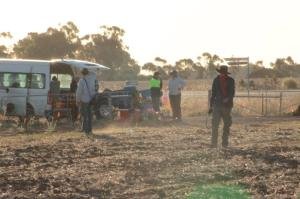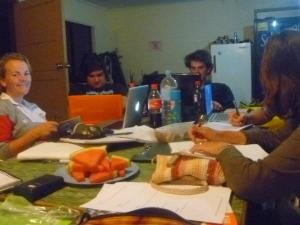Trudging back and forth across endless metres of the bare, sun-baked, Redbanks paddock, hunters scour the ground for treasures scattered across its surface to be flagged. Others stand by their tools and instruments retrieving the treasures already identified. As the hours pass by the hunters continue their search for the lost Seven Stars Hotel, recording every action and discovery to add to their treasure maps, in the hopes that they will be guided towards their prize, all the while being worn down by the unrelenting sun and flies. Finally as the sun begins to set the hunters scramble to return to their camp, eager to escape the patch of dirt where they have toiled since the early hours of the morning.

Trudging across the Redbanks paddock.
Photo courtesy of Jessica Lumb.
Upon arriving back at the camp, some move off to wash away the pain of the day beneath water, while other sidle off to wash away the pain by emptying glasses at the pub. As night sets in, most would think that the hunters, after having spent around nine hours working outdoors, battling sun, dirt and flies, would retire to their beds and recuperate, ready for the burden of the following day. But instead they gather in the meeting room and arrange themselves around the long table and begin the task of arranging what they have recorded during the day. Once again these hunters take up their instruments and tools and push on into the night. Eventually the group comes to a consensus and then in gradual waves, so as to not leave a comrade behind, they break away to collapse into their tents, to catch a few hours sleep before repeating the process all over again.

Working into the night.
Photo courtesy of Sam Deer.
For a week this routine continues until by the end, the hunters, or archaeologists as they should be called, collected around 1000 artefacts and mapped their scatter across the north-western corner of that Redbanks paddock.

